|
160 |
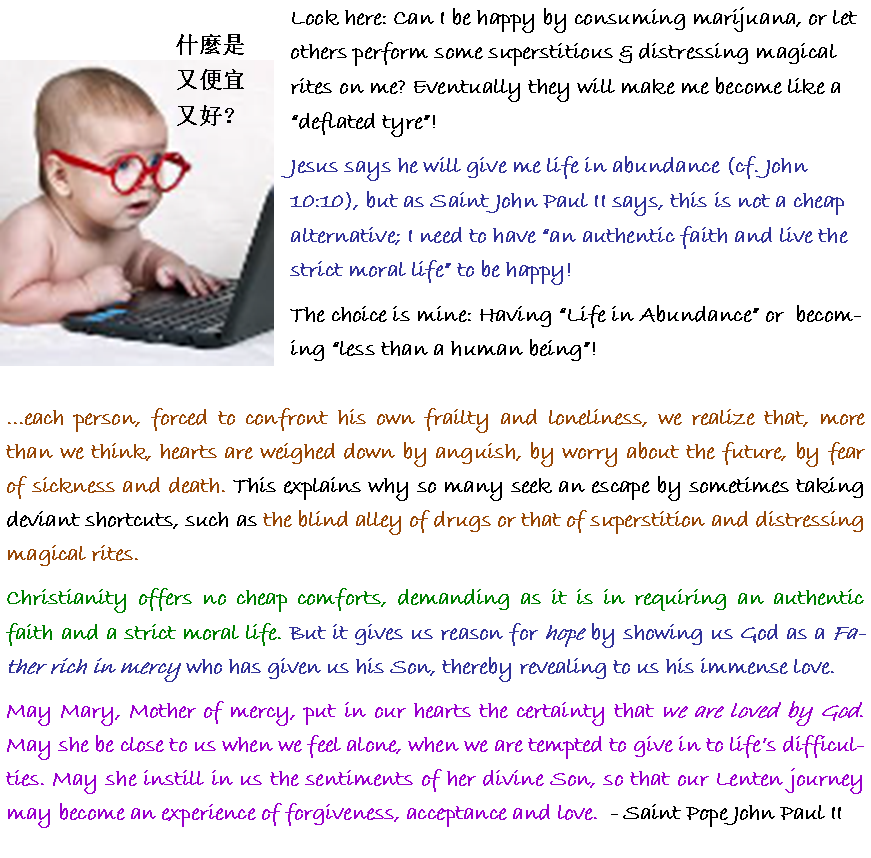
|
JOHN PAUL II ANGELUS Sunday, 9 March 1997
Dear Brothers and Sisters,
1. Halfway through our Lenten journey, on this Fourth Sunday of Lent we are invited to meditate on a theme at the heart of the Christian message, that is, God’s great love for humanity. In today’s Gospel we read: “God so loved the world that he gave his only Son so that whoever believes in him should not perish but have eternal life” (John 3:16).
Does contemporary man feel the need for this message? At first sight it would seem not, especially since in public expressions and in a certain prevalent culture, we can see the image of a humanity sure of itself, that willingly does without God and claims absolute freedom even from the moral law.
2. But when we look closely at the real situation of each person, forced to confront his own frailty and loneliness, we realize that, more than we think, hearts are weighed down by anguish, by worry about the future, by fear of sickness and death. This explains why so many seek an escape by sometimes taking deviant shortcuts, such as the blind alley of drugs or that of superstition and distressing magical rites.
Christianity offers no cheap comforts, demanding as it is in requiring an authentic faith and a strict moral life. But it gives us reason for hope by showing us God as a Father rich in mercy who has given us his Son, thereby revealing to us his immense love.
3. May Mary, Mother of mercy, put in our hearts the certainty that we are loved by God. May she be close to us when we feel alone, when we are tempted to give in to life’s difficulties. May she instil in us the sentiments of her divine Son, so that our Lenten journey may become an experience of forgiveness, acceptance and love. -------------------------------------------------------------------------
After praying the Angelus, the Holy Father said:
The past few days have brought reports of new and worrying situations.
From Zaire, we have had news of destruction and plundering. In the course of these events, the Church has also been profoundly affected: priests and religious have been killed and the faithful dispersed.
In our beloved neighbour, Albania, the situation has reached the tragic point of violence. In Jerusalem, the Israeli authorities have made grave decisions which have caught the concerned attention of the international community. They could seriously harm the peace process and the spirit of trust so necessary if that process is to continue.
In Lima, Peru, we are still waiting for the release of the hostages held at the Japanese embassy. I feel particularly close to them and their loved ones.
These are painful situations which stem from intransigent and selfish attitudes. But everyone knows that only with respect for all and with constructive dialogue can dignified solutions be found for everyone, solutions which will further social peace and understanding among peoples. I wish everyone a pleasant Sunday and a Lent of genuine interior renewal.
Pointing to the mountains surrounding Rome, the Holy Father said:
I wish to say that the parish I visited today is precisely there, near Castel Gandolfo, beneath those mountains. I wish you a pleasant Sunday and a good week. Praised be Jesus Christ! |
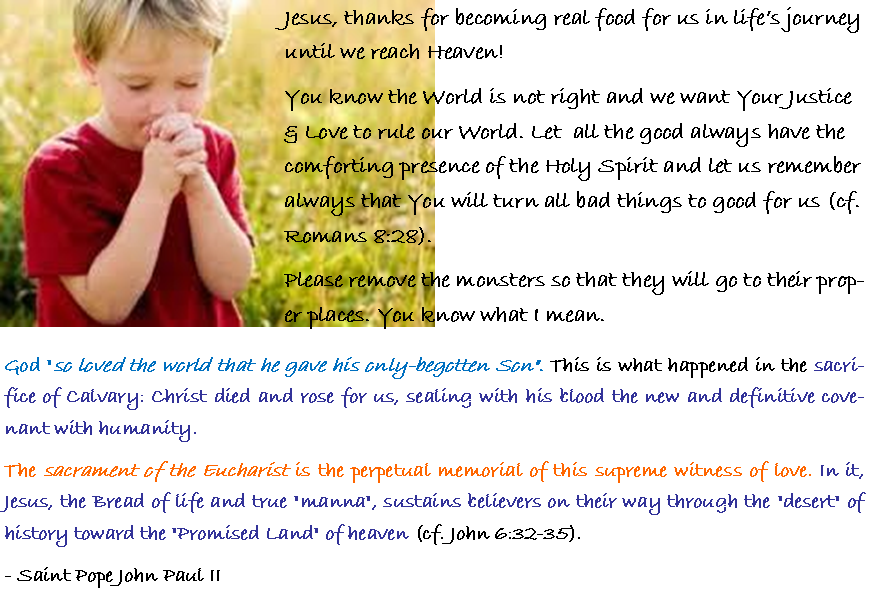
|
JOHN PAUL II ANGELUS Sunday 30 March 2003
Dear Brothers and Sisters,
1. Today, the Fourth Sunday of Lent, the Gospel reminds us that God "so loved the world that he gave his only Son, so that everyone who believes in him might not perish but might have eternal life" (John 3:16).
We hear this comforting proclamation at a time when painful armed confrontation threatens the hope of humanity for a better future. Jesus affirmed "God so loved the world". So then, the Father's love reaches every human being who lives in the world.
How can one not see the obligation that springs from such an initiative of God? Conscious of such great love, the human being can only open himself to an attitude of fraternal welcome towards his fellow human beings.
2. God "so loved the world that he gave his only-begotten Son". This is what happened in the sacrifice of Calvary: Christ died and rose for us, sealing with his blood the new and definitive covenant with humanity.
The sacrament of the Eucharist is the perpetual memorial of this supreme witness of love. In it, Jesus, the Bread of life and true "manna", sustains believers on their way through the "desert" of history toward the "Promised Land" of heaven (cf. John 6:32-35).
3. I wanted to dedicate to the subject of the Eucharist the Encyclical that, God willing, this Holy Thursday will be signed during the Mass of the Lord's Supper. I will hand it symbolically to the priests in place of the Letter that on that occasion I usually address to them and, through them, to all the People of God.
From this moment on, I entrust to Mary this important document, which recalls the intrinsic value and importance for the Church of the sacrament that Jesus left us as the living memorial of his death, resurrection and of our redemption.
We also turn to Mary to pray for the victims of the conflicts that are taking place. With grief-stricken and confident insistence, let us ask her intercession for peace in Iraq and in every other region of the world. ---------------------------------------------------------------------
After the Angelus
I greet the many members of the Focolare Movement who have come from a variety of European nations and are holding their annual meeting at Castel Gandolfo. Beloved, may the prayer of the Rosary always sustain your dedication to the Church and to society. |
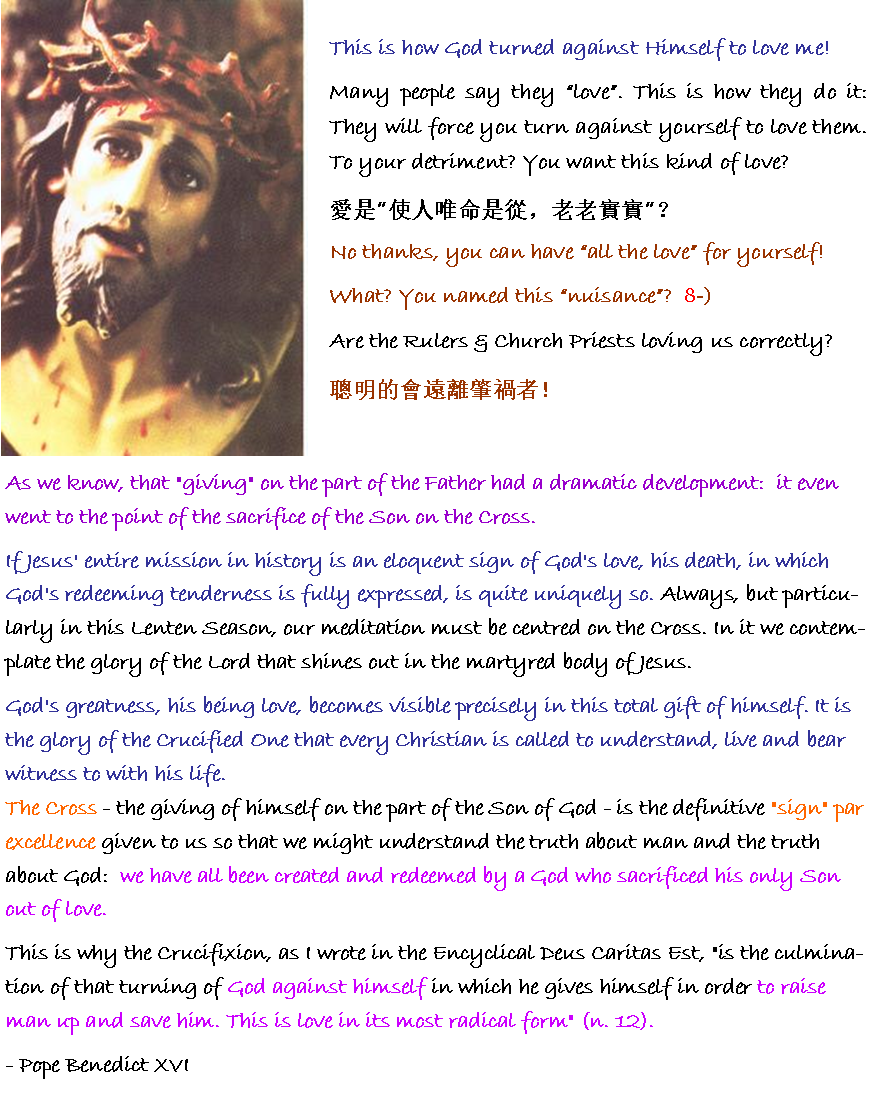
|
PASTORAL VISIT TO THE ROMAN PARISH OF «DIO PADRE MISERICORDIOSO» HOMILY OF HIS HOLINESS BENEDICT XVI IV Sunday of Lent, 26 March 2006
Dear Brothers and Sisters,
This Fourth Sunday of Lent, traditionally known as "Laetare Sunday", is permeated with a joy which, to some extent, attenuates the penitential atmosphere of this holy season: "Rejoice Jerusalem!", the Church says in the Entrance Antiphon, "Be glad for her... you who mourned for her". The refrain of the Responsorial Psalm echoes this invitation: "The memory of you, Lord, is our joy".
The deepest reason, however, lies in the message offered by the biblical readings that the liturgy presents to us today and that we have heard. They remind us that despite our unworthiness, God's infinite mercy is destined for us. God loves us in a way that we might call "obstinate" and enfolds us in his inexhaustible tenderness.
This is what already emerges from the First Reading from the Book of Chronicles in the Old Testament (cf. II Chronicles 36: 14-16, 19-23). The sacred author offers us a concise and meaningful interpretation of the history of the Chosen People, who suffered God's punishment as a consequence of their rebellious behaviour: the temple was destroyed and the people in exile no longer had a land; it truly seemed that God had forgotten them.
And then the Lord, demonstrating the absolute primacy of his initiative over every purely human effort, was to make use of a pagan, King Cyrus of Persia, to set Israel free.
In the text we have heard, the anger and mercy of the Lord alternate in a dramatic sequence, but love triumphs in the end, for God is love.
How can we fail to grasp from the memory of those distant events a message valid for all times, including our own? In thinking of the past centuries, we can see that God continues to love us even when he punishes us. Even when God's plans pass through trial and punishment, they always aim at an outcome of mercy and forgiveness.
This is what the Apostle Paul confirmed for us in the Second Reading, recalling that "God, who is rich in mercy, out of the great love with which he loved us, even when we were dead through our trespasses, made us alive together with Christ" (Ephesians 2: 4-5).
As we know, that "giving" on the part of the Father had a dramatic development: it even went to the point of the sacrifice of the Son on the Cross.
If Jesus' entire mission in history is an eloquent sign of God's love, his death, in which God's redeeming tenderness is fully expressed, is quite uniquely so. Always, but particularly in this Lenten Season, our meditation must be centred on the Cross. In it we contemplate the glory of the Lord that shines out in the martyred body of Jesus.
God's greatness, his being love, becomes visible precisely in this total gift of himself. It is the glory of the Crucified One that every Christian is called to understand, live and bear witness to with his life.
This is why the Crucifixion, as I wrote in the Encyclical Deus Caritas Est, "is the culmination of that turning of God against himself in which he gives himself in order to raise man up and save him. This is love in its most radical form" (n. 12).
The Gospel presents to us a person by the name of Nicodemus, a member of the Sanhedrin of Jerusalem who sought out Jesus by night. He was a well-to-do man, attracted by the Lord's words and example, but one who hesitated to take the leap of faith because he was fearful of others. He felt the fascination of this Rabbi, so different from the others, but could not manage to rid himself of the conditioning of his environment that was hostile to Jesus, and stood irresolute on the threshold of faith.
How many people also in our time are in search of God, in search of Jesus and of his Church, in search of divine mercy, and are waiting for a "sign" that will touch their minds and their hearts! Today, as then, the Evangelist reminds us that the only "sign" is Jesus raised on the Cross: Jesus who died and rose is the absolutely sufficient sign. Through him we can understand the truth about life and obtain salvation.
This is the principal proclamation of the Church, which remains unchanged down the ages. In meditating on the Lord's mercy that was revealed totally and definitively in the mystery of the Cross, the text that John Paul II had prepared for his meeting with the faithful on 3 April, Sunday in Albis, the Second Sunday of Easter last year, comes to my mind.
In the divine plans it was written that he would leave us precisely on the eve of that day, Saturday, 2 April - we all remember it well -, and for that reason he was unable to address his words to you. I would like to address them to you now, dear brothers and sisters. "To humanity, which sometimes seems bewildered and overwhelmed by the power of evil, selfishness and fear, the Risen Lord offers his love that pardons, reconciles and reopens hearts to hope. It is a love that converts hearts and gives peace".
The Pope, in this last text which is like a testament, then added: "How much the world needs to understand and accept Divine Mercy!" (Regina Caeli Reflection, read by Archbishop Leonardo Sandri, Substitute of the Secretariat of State, to the faithful gathered in St Peter's Square, 3 April 2005; L'Osservatore Romano English Edition, 6 April, p. 1, n. 2).
To understand and accept God's merciful love: may this be your commitment, first of all in your families and then in every neighbourhood milieu.
I hope for this with all my heart as I offer you my cordial greeting, starting with the priests who care for your community under the guidance of the parish priest, Fr Gianfranco Corbino, to whom I offer sincere thanks for having interpreted your sentiments in a beautiful presentation of this building, this "barque" of Peter and of the Lord.
I next extend my greeting to the Cardinal Vicar, Cardinal Camillo Ruini, and to Cardinal Crescenzio Sepe, the titular of your church, to the Vicegerent and the Bishop of the Eastern Sector of Rome and to all those who cooperate actively in the various parish services.
I also know that rather than discouraging you, the initial problems impelled you to unanimous apostolic work with special attention to the area of catechesis, the liturgy and charity.
Continue, dear friends, on the path on which you have set out, striving to make your parish a true family in which fidelity to the Word of God and the Church's Tradition may become, day after day, more and more your rule of life.
I know, moreover, that because of its original architectural structure, your church attracts many visitors. Make them appreciate not only the particular beauty of this sacred building, but especially the riches of a lively Community, eager to witness to the love of God, the merciful Father. That love is the true secret of Christian joy to which today, Laetare Sunday, invites us.
As we turn our gaze to Mary, "Mother of holy joy", let us ask her to help us deepen the reasons for our faith, so that, as today's liturgy urges us, renewed in the spirit and with a joyful heart, we may respond to the eternal and boundless love of God. |
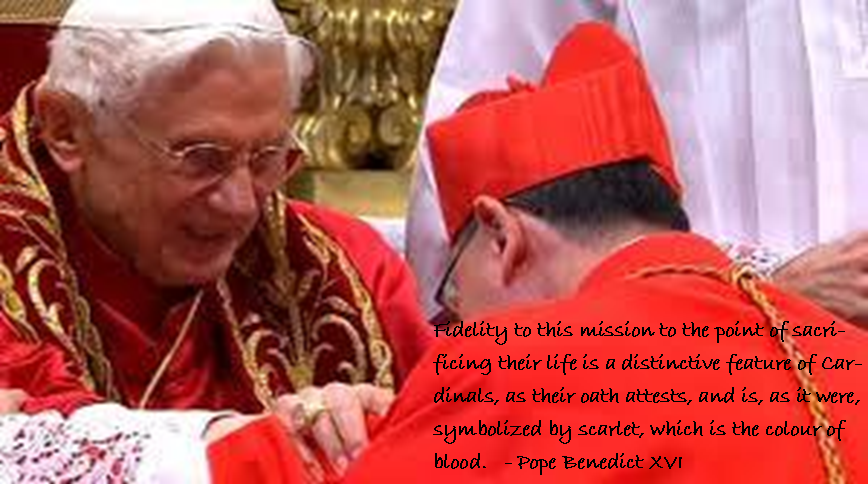
|
BENEDICT XVI ANGELUS Saint Peter's Square
The Consistory held in the past few days for the appointment of 15 new Cardinals was an intense ecclesial experience that enabled us to sample the spiritual riches of collegiality, of being together with brothers from various provenances, all of us sharing in one love for Christ and for his Church.
In a certain way we relived the reality of the first Christian community, gathered round Mary, Mother of Jesus, and Peter, to receive the gift of the Spirit and to commit themselves to spreading the Gospel throughout the world.
Fidelity to this mission to the point of sacrificing their life is a distinctive feature of Cardinals, as their oath attests, and is, as it were, symbolized by scarlet, which is the colour of blood.
By a providential coincidence, the Consistory took place on 24 March, when we commemorated the missionaries who died during the past year on the frontiers of evangelization and in the service of humanity in various parts of the globe.
Thus, the Consistory was an opportunity to feel closer than ever to all those Christians who suffer persecution in the cause of the faith. Their witness, news of which we receive every day, and especially the sacrifice of those who were killed, is edifying to us and spurs us to make an ever more sincere and generous commitment to evangelize.
My thoughts go in particular to those communities who live in countries where religious freedom is lacking or where, despite the fact that it is allowed on paper, it is actually restricted in many ways. I send them warm encouragement to persevere patiently in the love of Christ, a seed of the Kingdom of God that is coming, indeed, already exists in the world.
On behalf of the entire Church, I would like to express the warmest solidarity to all who work at the service of the Gospel in these difficult situations, and at the same time I assure them of my daily remembrance in prayer.
The Church moves on in history and spreads throughout the earth accompanied by Mary, Queen of the Apostles. For Christians, as in the Upper Room, the Blessed Virgin always constitutes the living memorial of Jesus. It is she who enlivens their prayers and sustains their hope. Let us ask her to guide us on our daily journey and to protect with special love those Christian communities that live in conditions of greater difficulty and suffering. ***
After the Angelus:
I am pleased to greet the English-speaking visitors gathered here today. On this Laetare Sunday, we are filled with joyful hope as we look forward to our celebration of the Lord's Resurrection, and we deepen our commitment to live these final weeks of Lent following closely in the footsteps of Christ our Saviour. I welcome especially those who have come to Rome in order to be present at the recent Consistory, in which I had the joy of creating 15 new Cardinals. I ask you to remember them in your prayers. Upon all of you and upon your families and loved ones I invoke God's abundant Blessings of joy and peace.
I wish you all a good Sunday! |
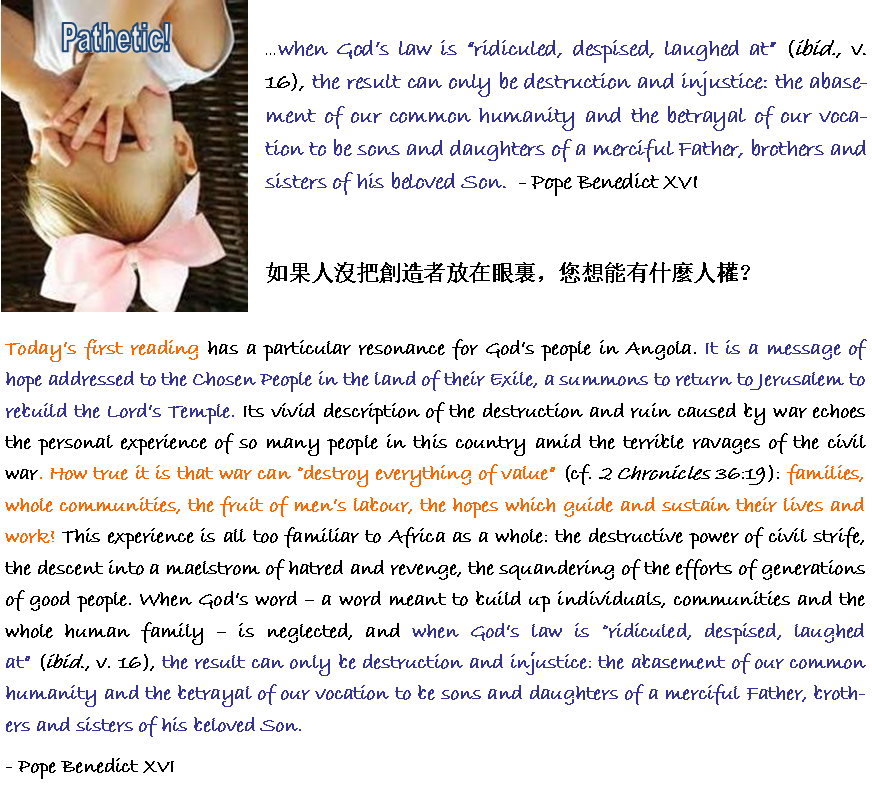
|
APOSTOLIC JOURNEY EUCHARISTIC CELEBRATION WITH THE BISHOPS OF I.M.B.I.S.A. HOMILY OF THE HOLY FATHER BENEDICT XVI Cimangola Square in Luanda
Dear Cardinals,
“God so loved the world that he gave his only Son, that whoever believes in him should not perish, but have eternal life” (John 3:16). These words fill us with joy and hope, as we await the fulfilment of God’s promises! Today it is my particular joy, as the Successor of the Apostle Peter, to celebrate this Mass with you, my brothers and sisters in Christ from throughout Angola, São Tomé and Príncipe, and so many other countries. With great affection in the Lord I greet the Catholic communities from Luanda, Bengo, Cabinda, Benguela, Huambo, Huìla, Kuàndo Kubàngo, Kunène, North Kwanza, South Kwanza, North Lunda, South Lunda, Malanje, Namibe, Moxico, Uíje and Zàire.
In a special way, I greet my brother Bishops, the members of the Inter-Regional Meeting of Bishops of Southern Africa, assembled around this altar of the Lord’s sacrifice. I thank the President of CEAST, Archbishop Damião Franklin, for his kind words of welcome, and, in the person of their Pastors, I greet all the faithful in the nations of Botswana, Lesotho, Mozambique, Namibia, South Africa, Swaziland and Zimbabwe.
Today’s first reading has a particular resonance for God’s people in Angola. It is a message of hope addressed to the Chosen People in the land of their Exile, a summons to return to Jerusalem to rebuild the Lord’s Temple. Its vivid description of the destruction and ruin caused by war echoes the personal experience of so many people in this country amid the terrible ravages of the civil war. How true it is that war can “destroy everything of value” (cf. 2 Chronicles 36:19): families, whole communities, the fruit of men’s labour, the hopes which guide and sustain their lives and work! This experience is all too familiar to Africa as a whole: the destructive power of civil strife, the descent into a maelstrom of hatred and revenge, the squandering of the efforts of generations of good people. When God’s word – a word meant to build up individuals, communities and the whole human family – is neglected, and when God’s law is “ridiculed, despised, laughed at” (ibid., v. 16), the result can only be destruction and injustice: the abasement of our common humanity and the betrayal of our vocation to be sons and daughters of a merciful Father, brothers and sisters of his beloved Son. |
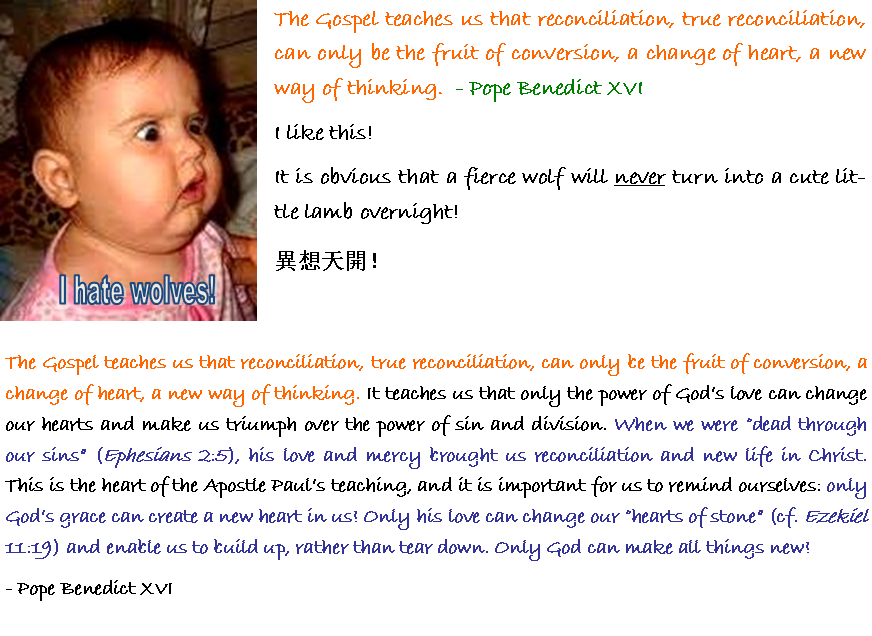
|
So let us draw comfort from the consoling words which we have heard in the first reading! The call to return and rebuild God’s Temple has a particular meaning for each of us. Saint Paul, the two thousandth anniversary of whose birth we celebrate this year, tells us that “we are the temple of the living God” (2 Corinthians 6:16). God dwells, we know, in the hearts of all who put their faith in Christ, who are reborn in Baptism and are made temples of the Holy Spirit. Even now, in the unity of the Body of Christ which is the Church, God is calling us to acknowledge the power of his presence within us, to re-appropriate the gift of his love and forgiveness, and to become messengers of that merciful love within our families and communities, at school and in the workplace, in every sector of social and political life.
Here in Angola, this Sunday has been set aside as a day of prayer and sacrifice for national reconciliation. The Gospel teaches us that reconciliation, true reconciliation, can only be the fruit of conversion, a change of heart, a new way of thinking. It teaches us that only the power of God’s love can change our hearts and make us triumph over the power of sin and division. When we were “dead through our sins” (Ephesians 2:5), his love and mercy brought us reconciliation and new life in Christ. This is the heart of the Apostle Paul’s teaching, and it is important for us to remind ourselves: only God’s grace can create a new heart in us! Only his love can change our “hearts of stone” (cf. Ezekiel 11:19) and enable us to build up, rather than tear down. Only God can make all things new!
It is to preach this message of forgiveness, hope and new life in Christ that I have come to Africa. Three days ago, in Yaoundé, I had the joy of promulgating the Instrumentum Laboris for the Second Special Assembly for Africa of the Synod of Bishops, which will be devoted to the theme: The Church in Africa in Service to Reconciliation, Justice and Peace. I ask you today, in union with all our brothers and sisters throughout Africa, to pray for this intention: that every Christian on this great continent will experience the healing touch of God’s merciful love, and that the Church in Africa will become “for all, through the witness borne by its sons and daughters, a place of true reconciliation” (Ecclesia in Africa, 79).
Dear friends, this is the message that the Pope is bringing to you and your children. You have received power from the Holy Spirit to be the builders of a better tomorrow for your beloved country. In Baptism you were given the Spirit in order to be heralds of God’s Kingdom of truth and life, of holiness and grace, of justice, love and peace (cf. Roman Missal, Preface of Christ the King). On the day of your Baptism you received the light of Christ. Be faithful to that gift! Be confident that the Gospel can affirm, purify and ennoble the profound human values present in your native culture and traditions: your strong families, your deep religious sense, your joyful celebration of the gift of life, your appreciation of the wisdom of the elderly and the aspirations of the young. Be grateful, then, for the light of Christ! Be grateful for those who brought it, the generations of missionaries who contributed – and continue to contribute – so much to this country’s human and spiritual development. Be grateful for the witness of so many Christian parents, teachers, catechists, priests and religious, who made personal sacrifices in order to pass this precious treasure down to you! And take up the challenge which this great legacy sets before you. Realize that the Church, in Angola and throughout Africa, is meant to be a sign before the world of that unity to which the whole human family is called, through faith in Christ the Redeemer. |
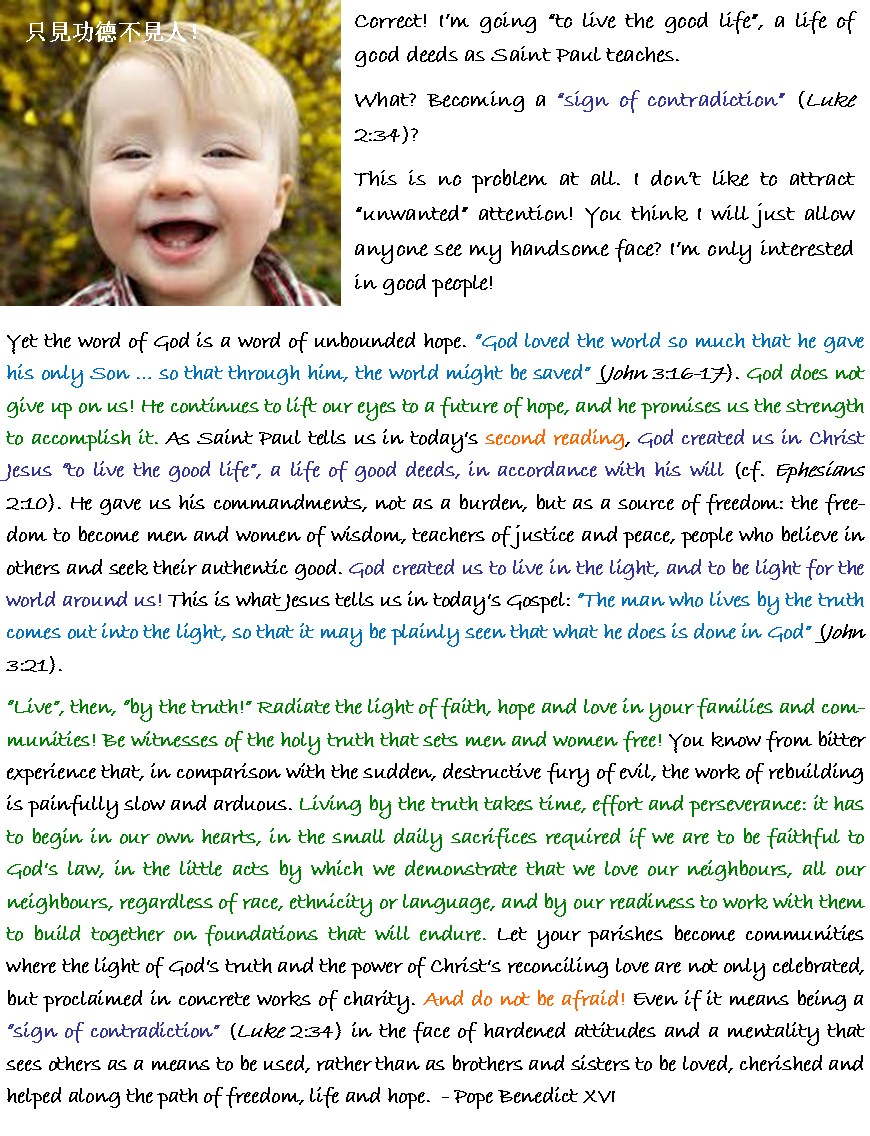
|
The words which Jesus speaks in today’s Gospel are quite striking: He tells us that God’s sentence has already been pronounced upon this world (cf. John 3:19ff). The light has already come into the world. Yet men preferred the darkness to the light, because their deeds were evil. How much darkness there is in so many parts of our world! Tragically, the clouds of evil have also overshadowed Africa, including this beloved nation of Angola. We think of the evil of war, the murderous fruits of tribalism and ethnic rivalry, the greed which corrupts men’s hearts, enslaves the poor, and robs future generations of the resources they need to create a more equitable and just society – a society truly and authentically African in its genius and values. And what of that insidious spirit of selfishness which closes individuals in upon themselves, breaks up families, and, by supplanting the great ideals of generosity and self-sacrifice, inevitably leads to hedonism, the escape into false utopias through drug use, sexual irresponsibility, the weakening of the marriage bond and the break-up of families, and the pressure to destroy innocent human life through abortion?
Yet the word of God is a word of unbounded hope. “God loved the world so much that he gave his only Son … so that through him, the world might be saved” (John 3:16-17). God does not give up on us! He continues to lift our eyes to a future of hope, and he promises us the strength to accomplish it. As Saint Paul tells us in today’s second reading, God created us in Christ Jesus “to live the good life”, a life of good deeds, in accordance with his will (cf. Ephesians 2:10). He gave us his commandments, not as a burden, but as a source of freedom: the freedom to become men and women of wisdom, teachers of justice and peace, people who believe in others and seek their authentic good. God created us to live in the light, and to be light for the world around us! This is what Jesus tells us in today’s Gospel: “The man who lives by the truth comes out into the light, so that it may be plainly seen that what he does is done in God” (John 3:21).
“Live”, then, “by the truth!” Radiate the light of faith, hope and love in your families and communities! Be witnesses of the holy truth that sets men and women free! You know from bitter experience that, in comparison with the sudden, destructive fury of evil, the work of rebuilding is painfully slow and arduous. Living by the truth takes time, effort and perseverance: it has to begin in our own hearts, in the small daily sacrifices required if we are to be faithful to God’s law, in the little acts by which we demonstrate that we love our neighbours, all our neighbours, regardless of race, ethnicity or language, and by our readiness to work with them to build together on foundations that will endure. Let your parishes become communities where the light of God’s truth and the power of Christ’s reconciling love are not only celebrated, but proclaimed in concrete works of charity. And do not be afraid! Even if it means being a “sign of contradiction” (Luke 2:34) in the face of hardened attitudes and a mentality that sees others as a means to be used, rather than as brothers and sisters to be loved, cherished and helped along the path of freedom, life and hope.
Let me close by addressing a special word to the young people of Angola, and to all young people throughout Africa. Dear young friends: you are the hope of your country’s future, the promise of a better tomorrow! Begin today to grow in your friendship with Jesus, who is “the way, and the truth and the life” (John 14:6): a friendship nurtured and deepened by humble and persevering prayer. Seek his will for you by listening to his word daily, and by allowing his law to shape your lives and your relationships. In this way you will become wise and generous prophets of God’s saving love. Become evangelizers of your own peers, leading them by your own example to an appreciation of the beauty and truth of the Gospel, and the hope of a future shaped by the values of God’s Kingdom. The Church needs your witness! Do not be afraid to respond generously to God’s call, whether it be to serve him as a priest or a religious, as a Christian parent, or in the many forms of service to others which the Church sets before you.
Dear brothers and sisters! At the end of today’s first reading, Cyrus, King of Persia, inspired by God, calls the Chosen People to return to their beloved land and to rebuild the Temple of the Lord. May his words be a summons to all God’s People in Angola and throughout Southern Africa: Arise! Ponde-vos a caminho!(cf. 2 Chronicles 36:23) Look to the future with hope, trust in God’s promises, and live in his truth. In this way, you will build something destined to endure, and leave to future generations a lasting inheritance of reconciliation, justice and peace. Amen.
26 April 2015, 5:00pm SGT |